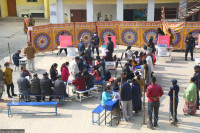National
Sagarmatha Sambaad kicks off today
Top delegates include China’s Xiao Jie, India’s Bhupender Yadav, COP 29 president, and ministers from Bhutan, Bangladesh, and the Maldives.
Post Report
The first edition of the much-touted Sagarmatha Sambad, a multi-stakeholder dialogue forum, committed to deliberating on the most pressing global, regional, and national issues, is set to begin in Kathmandu on Friday.
Prime Minister KP Sharma Oli will inaugurate the three-day event, which will feature a dozen parallel sessions on critical climate-related issues. These include a high-level session on collaboration and cooperation among ministers from Hindu Kush Himalayan Region, and multi-stakeholder roundtable discussions on issues like ecosystem services, the ‘recognise, respect and reward’ approach, climate-induced disasters, risk reduction and resilience, and innovative climate and carbon financing.
Following the inauguration on Friday, a series of parallel sessions will be held on different 12 themes till Saturday. After these sessions conclude, a high-level session among ministers from the Hindu Kush region, and multi-stakeholder roundtable discussion with global and regional partners will be held on Saturday, according to the Sambad’s website.
The main theme of the event is “Climate change, mountains and the future of humanity”, and 350 national and international delegations are expected to participate, according to Foreign Minister Arzu Rana Deuba.
“This is a platform to deliberate, discuss and deliver on the most pressing challenges of our time—climate change, economic instability, rising inequality, AI and technological disruption, public health threats, disasters, and the peace we seek to preserve across our world,” Prime Minister Oli said on Thursday, on the eve of the event. “Climate crisis is the number one threat now,” he added.
“Just look around. Our bare mountains, receding glaciers, loss of biodiversity, erratic weather patterns and rising sea levels. These signs are unmistakable. Climate change is no longer a distant threat. It’s real and happening now, affecting us all,” said the prime minister in his message.
On Sunday, some delegates will be taken to Sagarmatha (Nepali name for Mt Everest) followed by high-level side events focussing on the triple planetary crisis—air pollution, biodiversity loss, and climate change, and on overcoming financial challenges to climate justice and sustainable development. The Sagarmatha Sambad Declaration will be unveiled after the conclusion of these back-to-back sessions. After the closing session, some delegates will visit the Vajra Academy, an eco-friendly school, which is also known as Nepal’s model green school, in Godawari, Lalitpur.
According to Foreign Minister Deuba, altogether 350 delegates and participants will attend, including 175 foreign guests. “We have received high-level delegations from 12 countries,” she said.
Despite the government's invitations, no head of state or government is attending the country’s flagship global event, which was announced in January. One of the highest-ranking guests is Xiao Jie, vice chairman of the Standing Committee of China’s 14th National People's Congress (NPC) who landed in Kathmandu and met with Prime Minister Oli on Thursday.
Other notable guess including Bhupender Yadav, India’s minister of Environment, Forest and Climate Change; Mukhtar Babayev, COP29 president and minister of Ecology and Natural Resources of Azerbaijan; Sharmeen Soneya Murshid, advisor to the Ministry of Social Welfare and the Ministry of Women and Children Affairs of Bangladesh; Gem Tshering, minister for Energy and Natural Resources, Bhutan; and Thoriq Ibrahim, minister of Tourism and Environment of the Maldives.
Several ambassadors, senior officials, experts, and heads of UN agencies, donors, regional and multilateral organisations, universities, thank tanks, research organisations, civil society groups, and NGOs are also participating in various capacities, Deuba added.
“In conclusion, we firmly believe that Nepal can be established as a leading figure in neutral, dialogue-oriented diplomacy,” said Deuba, “By highlighting Nepal's commitment to global issues, fostering cooperation and partnerships, and boosting national confidence, Nepal’s global image can be appropriately strengthened.”
“This dialogue is a global platform, and not only for Nepal, but a common platform and a significant opportunity for all,” she added.
But some lawmakers have expressed concerns over the lack of foreign high-level dignitaries in the event.
Chairman of the Janata Party and former minister Prabhu Sah has criticised the effectiveness of the Sagarmatha Dialogue, questioning its credibility. He stated that as no head of state, head of government, or foreign minister from any country is confirmed to attend, the prestige of the event is questionable.
“The Sagarmatha Dialogue is starting tomorrow, but questions are already being raised about its effectiveness. Though it was claimed there would be high-level participation from around the world, it is now clear that no head of state, government, or foreign minister from any country will be participating,” he said while speaking in Parliament.
“If this event truly aims to ensure the future of humanity and the planet, and to mitigate the risks of climate change, then the relevant stakeholders from those countries should have been made to understand its importance.”
“But what we see today is there is no confirmation of participation from them. Forget countries across the oceans—even our neighbours are not sending high-level representatives. Neither India nor China has sent high-level delegates. Even the Secretary-General of the United Nations is not attending,” Sah added.




 27.48°C Kathmandu
27.48°C Kathmandu













